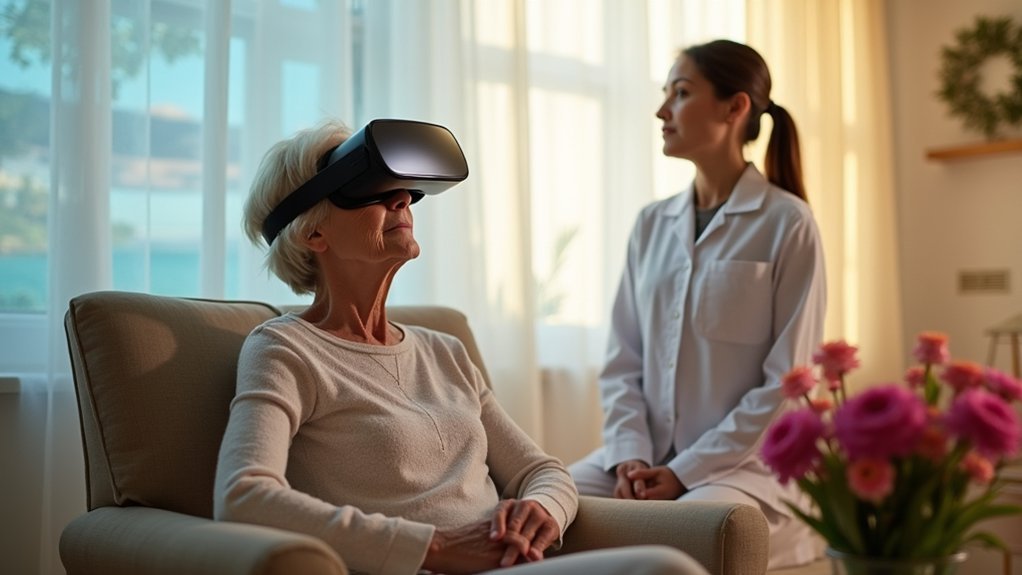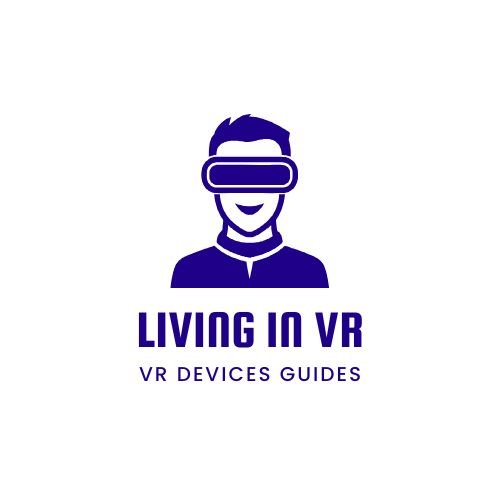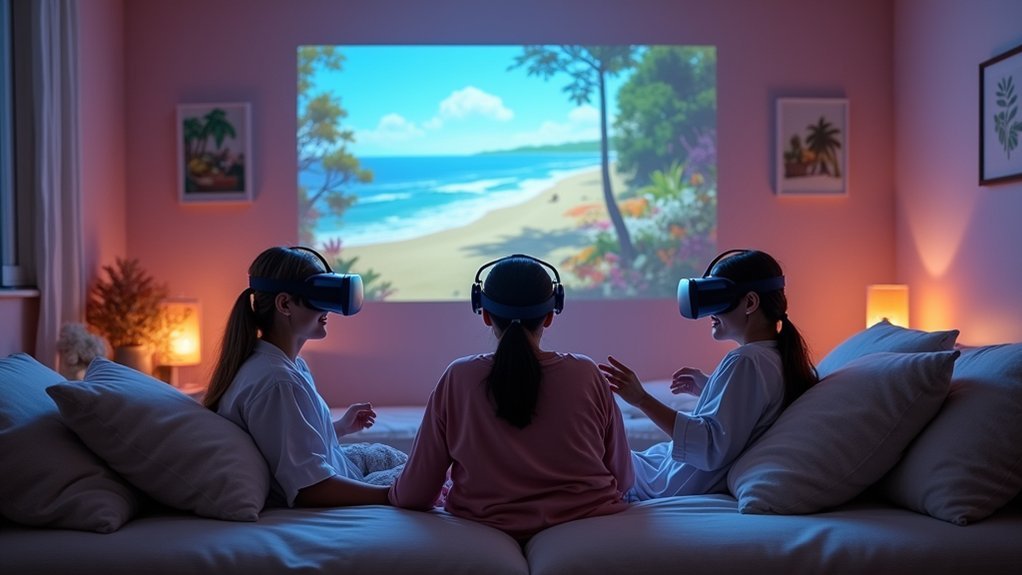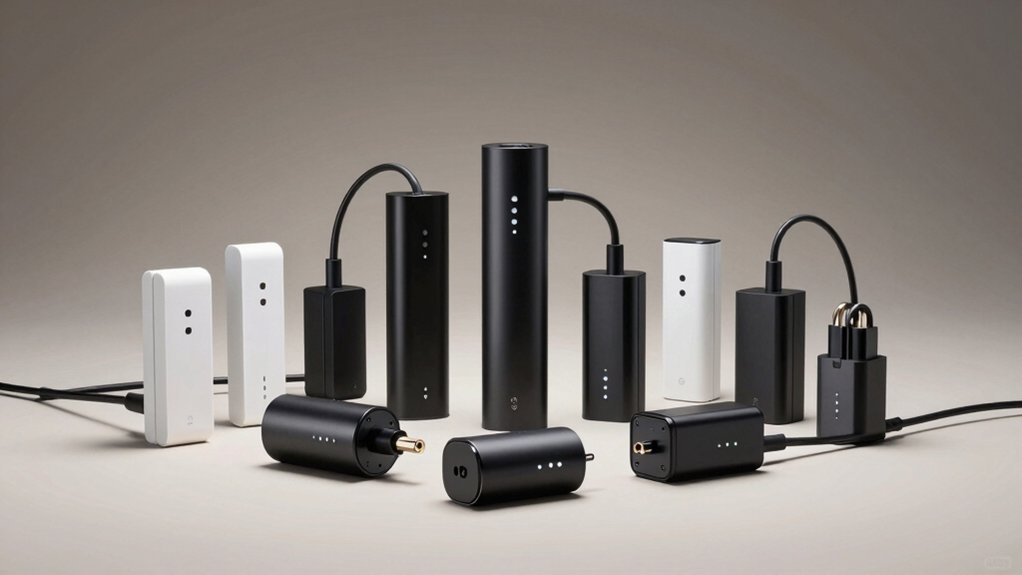You’ll discover three groundbreaking VR therapies revolutionizing dementia care: Virtual Reminiscence Therapy uses 360-degree environments to connect patients with cherished memories and familiar places, markedly reducing anxiety according to NHS Walsall research. Cognitive Skill Training creates safe digital spaces for practicing daily activities like cooking and cleaning without real-world consequences. Calming Immersive Experiences transform emotional well-being by reducing behavioral symptoms and distress. These personalized approaches enhance quality of life while supporting caregiver interactions and patient autonomy through innovative therapeutic breakthroughs that’ll reshape traditional treatment methods.
Virtual Reminiscence Therapy: Reconnecting Through Familiar Places and Memories

When dementia begins to cloud familiar memories, Virtual Reminiscence Therapy offers a powerful digital bridge back to cherished moments and places. This innovative VR approach creates immersive experiences using 360-degree filmed environments and Google Street View panoramas, allowing you to revisit locations that hold personal significance.
The therapy’s personalized design triggers memory recall by connecting you with familiar places from your past. Research from NHS Walsall demonstrates that these virtual journeys greatly reduce anxiety and behavioral and psychological symptoms of dementia in most participants.
Cognitive Skill Training: Practicing Daily Activities in Safe Virtual Environments
As dementia progresses and daily tasks become increasingly challenging, Cognitive Skill Training through VR creates a protective digital space where you can practice essential activities like cooking, cleaning, and personal care without facing real-world consequences.
This immersive technology bridges gaps between traditional dementia care and your evolving needs, enhancing abilities through repeated virtual practice.
You’ll use affordable VR headsets with smartphones, making this Virtual Reality Therapy accessible to more patients. Safe environments allow experimentation with different scenarios, building confidence and promoting independence in daily activities.
Clinical trials compare VR training groups against traditional activity controls, measuring effectiveness in cognitive skill training.
These virtual sessions let you safely navigate kitchen hazards, practice medication routines, and rehearse social interactions, transforming how dementia care supports your autonomy.
Calming Immersive Experiences: Reducing Anxiety and Behavioral Symptoms

Beyond skill-building exercises, VR therapy transforms your emotional well-being through carefully designed calming environments that directly target anxiety and behavioral symptoms associated with dementia.
These immersive experiences transport you to peaceful virtual settings that evoke positive emotions and cherished memories. Research from the University of Kent demonstrates how calming VR markedly enhances your improved mood and overall well-being, establishing VR as a powerful therapeutic tool.
VR therapy creates peaceful virtual environments that trigger positive memories and significantly improve mood and well-being in dementia patients.
When you’re immersed in personalized environments, they trigger long-term memories that reduce anxiety and alleviate distress.
These virtual experiences also enhance social connections, creating conversation opportunities with caregivers. By providing safe, stress-free interactions, VR therapy improves your quality of life while reducing caregiver burden for dementia patients.
Frequently Asked Questions
Is Virtual Reality Good for Dementia Patients?
You’ll find virtual reality beneficial for dementia patients. It reduces anxiety, improves mood, triggers memory recall through familiar environments, and enhances social interaction. You’re seeing promising non-pharmacological treatment that markedly improves quality of life.
What Is the UCSF Living With Dementia Caregiver Support Group?
You’ll find the UCSF Living With Dementia Caregiver Support Group offers regular meetings where you can share experiences, learn coping strategies, access educational resources, and connect with other caregivers facing similar challenges.
What Stage of Dementia Is Not Eating?
You’ll typically see eating problems in moderate to severe dementia stages. During advanced stages, you’re likely to notice food refusal, forgetting how to eat, and swallowing difficulties become prominent concerns.
How to Slow Down Dementia Naturally?
You can slow dementia naturally by exercising regularly, eating Mediterranean-style foods rich in omega-3s, staying socially connected, doing cognitive training like puzzles, and managing hearing loss, depression, and stress effectively.





Leave a Reply